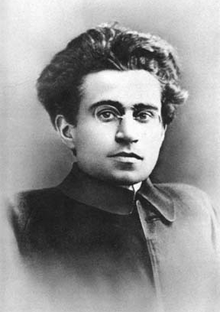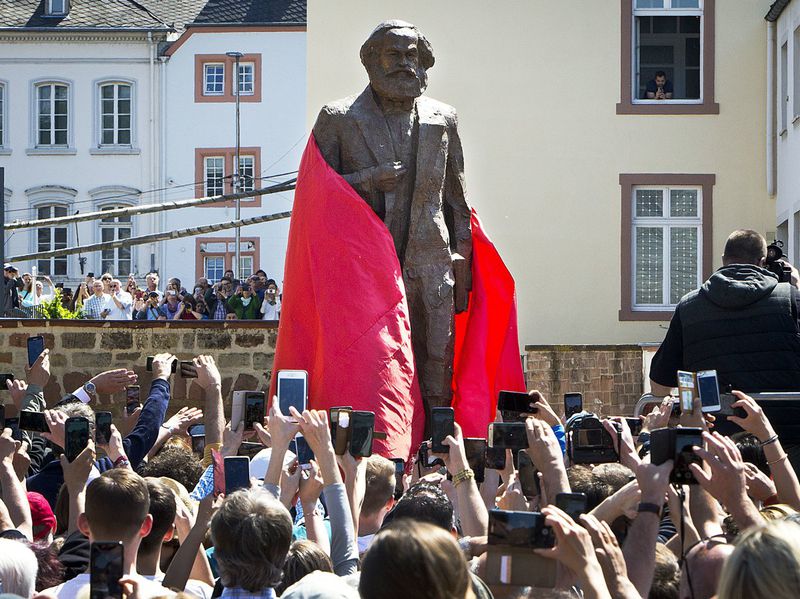
In 1921 a founder of Italian Communist Party. Wrote extensively while in prison under Mussolini from 1926 until his death. “… losing his way in familiar streets, taking the wrong train, indifferent to the comfort of his lodgings..; but intectually, he was absolutely alive. Trained intuitively in the dialectic, quick to uncover falsehood and transfix it with the sting of irony, he viewed the world with exceptional clarity”. (Serge)
Gramsci is renowned for his development of the idea of Hegemony and the need for the proletariat to establish “intellectual and moral leadership” of the masses, for criticizing overly deterministic conceptions of historical development which predominated in the Marxist movement up till 1917, for emphasizing the role of the party in formation of a class, rather than simply representing a class, likening the role of a political party to that of Machiavelli’s Prince, and thus for emphasizing the ideological aspects of political struggle.
Antonio Francesco Gramsci was an Italian Marxist philosopher, journalist, linguist, writer and politician. He wrote on philosophy, political theory, sociology, history and linguistics. He was a founding member and one-time leader of the Communist Party of Italy and was imprisoned by Benito Mussolini’s Fascist regime. (Wikipedia)
Pre-Prison Political Writings 1910-1926
1916
Newspapers and the Workers (Avanti!, 22 December 1916)
Men or machines? (Avanti!, 24 December)
1917
Character (Grido del Popolo, 3 March 1917)
Notes on The Russian Revolution (Grido del Popolo, 29 April)
The Russian Maximalists (Grido del Popolo, 28 July)
The Revolution Against ‘Capital’ (Avanti!, 24 November)
1918
One Year of History (Grido del Popolo, 16 March 1918)
1919
Red Ink (Avanti!, 4 April 1919)
The Price of History (L’Ordine Nuovo, 7 June 1919)
Workers’ democracy (L’Ordine Nuovo, 21 June 1919)
The conquest of the state (L’Ordine Nuovo, 12 July 1919)
Workers and peasants (L’Ordine Nuovo, 2 August 1919)
The development of the revolution (L’Ordine Nuovo, 13 September 1919)
Chronicles of the new order (L’Ordine Nuovo, 13 September 1919)
To the section commissars of the FIAT-Brevetti workshops (L’Ordine Nuovo, 13 September 1919)
Unions and councils (L’Ordine Nuovo, 11 October 1919)
Unions and the dictatorship (L’Ordine Nuovo, 25 October 1919)
Revolutionaries and elections (L’Ordine Nuovo, 15 November 1919)
The problem of power (L’Ordine Nuovo, 29 November 1919)
The events of 2-3 December (1919) (L’Ordine Nuovo, 13 December 1919)
1920
Workers and peasants (L’Ordine Nuovo, 3 January 1920)
Split or Disorder? (L’Ordine Nuovo, December 11-18, 1920)
1921
The ape people (L’Ordine Nuovo,* 1 January)
Caporetto and Vittorio Veneto (L’Ordine Nuovo, 28 January)
War is war (L’Ordine Nuovo,* 31 January)
Worker’s control (L’Ordine Nuovo, 10 February)
The general confederation of labour (L’Ordine Nuovo, 25 February)
Real dialectics (L’Ordine Nuovo, 3 March)
Officialdom (L’Ordine Nuovo, 4 March)
Unions and councils (L’Ordine Nuovo, 5 March)
Italy and Spain (L’Ordine Nuovo, 11 March)
Socialists and communists (L’Ordine Nuovo, 12 March)
The Turin factory council movement (L’Ordine Nuovo,* 14 March 1921)
England and Russia (L’Ordine Nuovo, 18 March)
The italian parliament (L’Ordine Nuovo, 24 March)
The Communists and the Elections, (L’Ordine Nuovo, 12 April 1921)
The Elections and Freedom (L’Ordine Nuovo, 21 April 1921)
Elemental Forces (L’Ordine Nuovo, 26 April 1921)
Men of Flesh and Blood (L’Ordine Nuovo, May 8, 1921)
The Old Order in Turin (L’Ordine Nuovo, 18 May 1921)
Socialists and Fascists (L’Ordine Nuovo, 11 June 1921)
Reactionary Subversiveness (L’Ordine Nuovo, 22 June 1921)
Referendum (L’Ordine Nuovo, 29 June 1921)
Leaders and Masses (L’Ordine Nuovo, 3 July 1921)
Bonomi (L’Ordine Nuovo, 5 July 1921)
The “Arditi del Popolo” (L’Ordine Nuovo, 15 July 1921)
The Development of Fascism (L’Ordine Nuovo, 21 July 1921)
Against Terror (L’Ordine Nuovo, 19 August 1921)
The Two Fascisms (L’Ordine Nuovo, 25 August 1921)
The Grimace of Gwynplaine (L’Ordine Nuovo, 30 August 1921)
The Agrarian Struggle in Italy (L’Ordine Nuovo, 31 August 1921)
The tactic of failure (L’Ordine Nuovo, 22 September 1921)
Those Mainly Responsible (L’Ordine Nuovo, 20 September 1921)
Parties and Masses (L’Ordine Nuovo, 25 September 1921)
Masses and Leaders (L’Ordine Nuovo, 30 October 1921)
1922
The “Alleanza del Lavoro”
A Crisis within the Crisis
The Genoa Conference and Italy
Lessons (L’Ordine Nuovo,5 May 1922)
1924
Editorial: March 1924
“Leader”
The Vatican
Against Pessimism
Gramsci to Togliatti, Scoccimarro, Leonetti, etc. (21 March 1924)
The Programme of L’Ordine Nuovo
Problems of Today and Tomorrow
Gramsci to Zino Zini (2 April 1924)
Gramsci to Togliatti, Scoccimarro, etc. (5 April 1924)
The Como Conference: Resolutions
Gramsci’s Intervention at the Como Conference
The Italian Crisis
Neither Fascism nor Liberalism: Sovietism!
Democracy and Fascism
The Fall of Fascism
1925
Report to the Central Committee: 6 February 1925
Introduction to the First Course of the Party School
Speech to the Italian parliament, 16 May 1925
The Internal Situation in our Party and the Tasks of the Forthcoming Congress
Elements of the Situation
Maximalism and Extremism (L’Unità, July 2 1925) *
Sterile and Negative Criticism (L’Unità September 30, 1925) *
On the Operations of the Central Committee of the Party (L’Unità December 20, 1925) *
1926
The Italian situation and the tasks of the PCI (Lyons, January 1926)
The party’s first five years (L’Unita, 24 February 1926)
A study of the Italian situation (Report to Party Executive Committee, 2-3 August 1926.)
The peasants and the dictatorship of the proletariat (L’Unità, 17 September 1926)
Once again on the organic capacities of the working class (L’Unità, 1 October 1926)
We and the Republican Concentration (L’Unità, 13 October 1926)
Some aspects of the southern question (Unfinished, October 1926)
Letter to Palmiro Togliatti *, October 1926
1928
Letter to Tania Schucht 2 January 1928
Letter from Prison to his Son, Giuliano, * 1936

